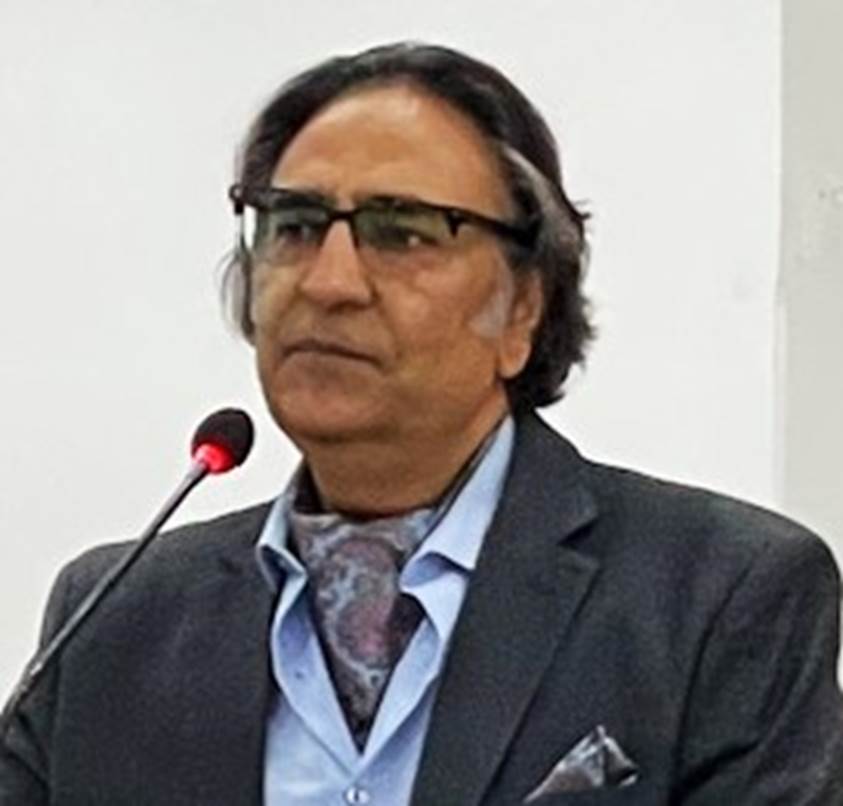
Saqlain Kazmi, son of Musheer Kazmi, who compiled the book
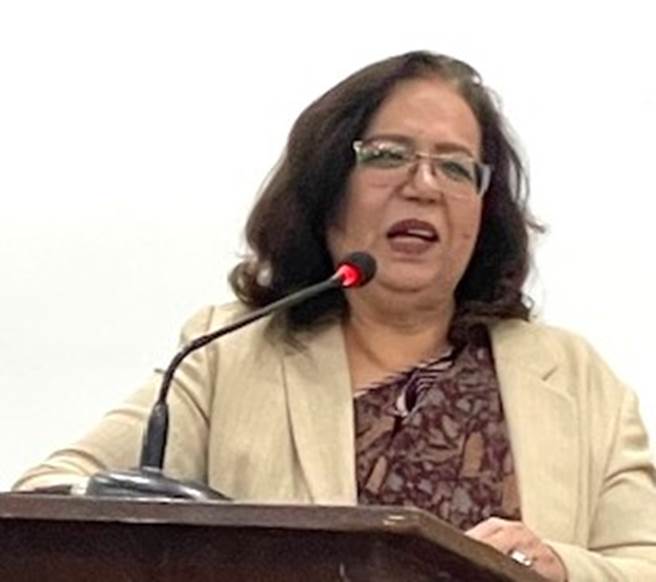
Dr Fatema Hassan, organizer of the event
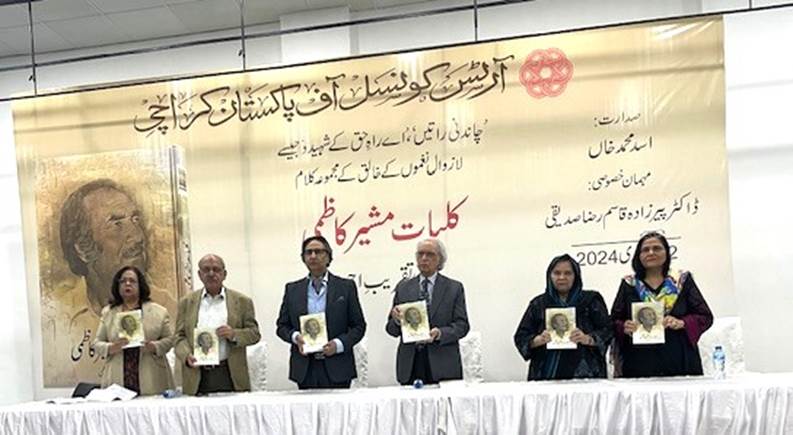
Book -launching ceremony
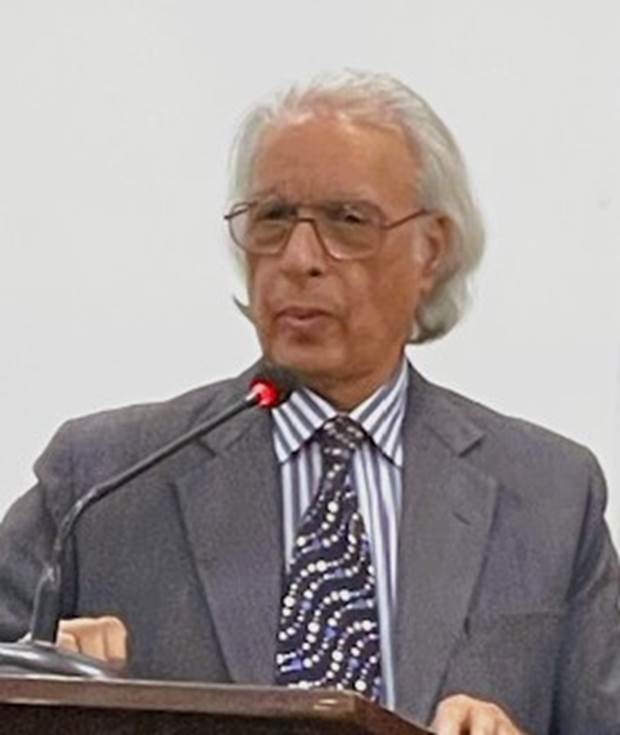
Professor Peerzada Qasim Siddiqi
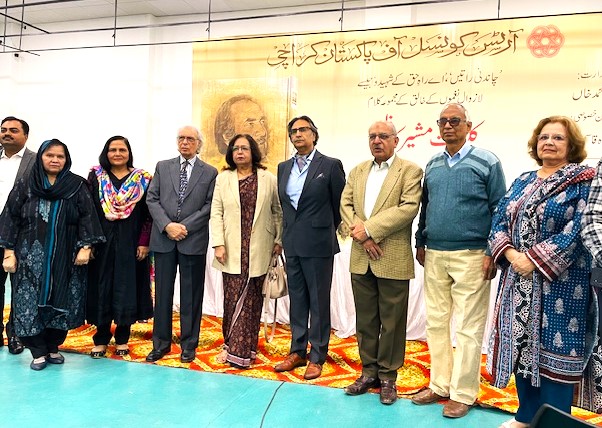
Speakers at the event
Kulliyat-e-Musheer Launched at Impressive Book-Release Ceremony at The Arts Council of Pakistan
By Zafar Iqbal, PhD

Karachi: At the book release ceremony held at the Arts Council of Pakistan in Karachi, Professor Peerzada Qasim Raza Siddiqi, presiding over the event, warmly expressed how the unveiling of Kulliyaat-e-Musheer possessed the enchanting ability to resurrect cherished memories from our childhood. These memories, he noted, were intricately woven with popular songs that resonated in our ears.
Dr Fatema Hassan, Chief Organizer of the Josh Malihabadi Memorial Library at The Arts Council of Pakistan, Karachi, orchestrated this literary soirée on behalf of the Arts Council, creating a captivating gathering that unfolded on January 22, 2024. The occasion drew a substantial presence of distinguished literary figures, adding an extra layer of significance to the celebratory atmosphere.
The focal point of the evening was the book itself, Kulliyat-e-Musheer, a compilation of Musheer Kazmi's poetry meticulously curated and published by his son, Saqlain Kazmi. Esteemed literary personalities took center stage, passionately discussing Musheer Kazmi's poetic prowess and his noteworthy contributions to the cinematic world. Notable speakers included Dr Fatema Hassan, Dr Aqeel Abbas Jafri, Naheed Sultana Mirza, Dr Rukhsana Saba, Saqlain Kazmi, and Dr Peerzada Qasim. The event was expertly moderated by Shakeel Khan, adding a seamless flow to the insightful discussions and reflections on the rich legacy of Musheer Kazmi.
Syed Musheer Hussain Kazmi, the son of Syed Shabeer Hussain Kazmi, known as Musheer Kazmi, was born on April 22, 1924, in Banur Riyasat Patiala, India. His illustrious career in the world of cinema was marked by a pivotal moment—the inception of the iconic song "Chandani Raatein" in the 1952 film "Dopatta” and the famous Dhamaal, “Dama Dam Mast Qalandar.”
Tasked with writing film songs by the producer Sibtain Fazli, Musheer Kazmi faced challenges, with his initial attempts failing to secure approval. Faced with the ultimatum of delivering a successful song or risking his job, he found inspiration under the evening sky on the rooftop of a Lahore building. It was there that the words of the now widely celebrated "Chandani Raatein" were born.
Throughout his career, Musheer Kazmi penned a remarkable 97 songs for more than 50 films. His creative contributions extended beyond writing, as he made a name for himself as a renowned songwriter, director, and producer from 1952 to 1975.
The events of the 1965 war and the separation of East Pakistan in 1971 left an indelible mark on Musheer Kazmi, a reflection evident in his poignant poetry featured in his book. With fervent passion, Kazmi delved into the intricacies of political maneuvering, rampant corruption, and the pressing issues of the time, such as challenges in the realms of food and electricity, which deeply affected the common populace. Notably, the verses penned by Kazmi over half a century ago resonate with timeless relevance, mirroring the enduring nature of the societal concerns he addressed, which persist even in the present day.
His accomplishments were duly recognized by the government, and Musheer Kazmi was honored with prestigious awards, including Hilal-e-Istaqlal and the title of Poet of Pakistan. Additionally, his literary legacy lives on through published works such as "Haftroza Aanchal," "Khanum," and "Arz-e-Paak."
Tragically, Musheer Kazmi's journey came to an end on December 8, 1975, in Lahore, Pakistan. Despite his untimely departure, his contributions to the world of cinema and literature continue to resonate, leaving an indelible mark on the cultural landscape of Pakistan.

